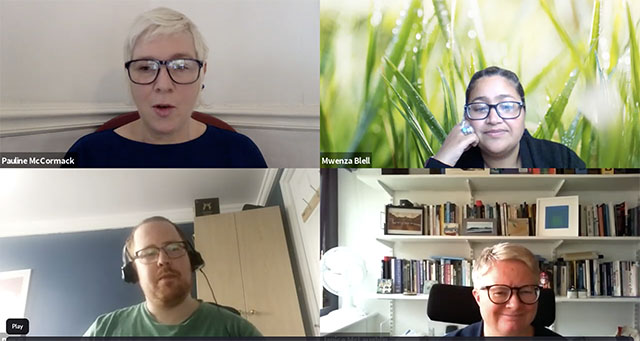Mwenza Blell, Lisa Garforth, Daniel Goodman, Pauline McCormack, Janice McLaughlin
School of Geography, Politics and Sociology
Faculty of Humanities and Social Sciences
What did you do?
Sociology, like all other teaching units at Newcastle during the pandemic, faced massive challenges adapting teaching practice and approaches to the rapid switch to online teaching. In the summer of 2020 a working group, which became the Teaching Online Group (TOG), was created to develop an approach to helping colleagues prepare for the new academic year. We decided very early to carry on the group and its supportive role across the whole academic year. The group and its activities became a continued point of much needed collaborative advice and sharing across the year. We also undertook a research project funded by the School’s Education Committee to reflect on the work of the TOG and what we might take from it for continuing to support colleagues and develop online approaches further.
Who is involved?
- The Teaching Online Group (Mwenza Blell, Lisa Garforth, Pauline McCormack, Janice McLaughlin)
- Research Associate (Daniel Goodman)
- Sociology teaching colleagues

How did you do it?
The TOG was made up of colleagues who volunteered. We had different levels of knowledge and expertise of using online teaching, but all had an interest in finding ways to ease the burden on colleagues and develop good practices. Accessibility for students was a central concern. We knew from the beginning that practical advice and support would be key and that an element of reactivity was inevitable. But we also wanted to ensure that pedagogy was part of the discussion and to be proactively looking for opportunities for positive changes in learning and teaching that the shift to online/hybrid opened. We focused on 2 activities:
- Creating a Canvas site to collate resources and advice we had brought together and created.
- Developed and hosted ‘teaching online cafes’ that ran in the run up to semester 1 to help teaching colleagues, including post-graduates who teach, prepare material and approaches. The cafes proved very popular with colleagues, and it was clear there was a strong desire to keep them running during the academic year.
The subsequent research project involved a RA (Daniel Goodman) undertaking a focus group with students and one to one interviews with colleagues who had taught in 2020-21. The findings of the project have been captured in a website that explores what colleagues gained from the TOG and how its approach worked within the contexts of the uncertainties and challenges everyone faced.
Why did you do it?
After the crisis management of the end of semester 2 in 2020, the Head of Unit recognised colleagues needed support in planning for the new academic year. While LTDS was providing a lot of advice and training, there was a need to filter and translate it to the needs of our colleagues and students. Colleagues were faced with developing new online teaching approaches, which included learning new software, alongside other significant software changes with the switch to Canvas and the move to Sharepoint and Office 365. The university experienced a cyber incident in late summer 2020 that destabilised colleagues’ access to the new software needed to prepare their teaching. Colleagues were also living in a pandemic, including working from home, undertaking varied caring responsibilities, and managing both personal and professional worries and concerns. It was in these contexts, that the TOG was tasked with developing doable teaching approaches that could work in a continued period of uncertainty.
Does it work?
The value of a collaborative approach to redeveloping teaching and learning has come through strongly in the research project and in our reflections on the activities of the TOG. Specifically:
- The cafes and Canvas resources allowed colleagues to creatively learn together by providing dialogic spaces away from the practicalities and urgencies of teaching.
- The TOG provided a context where people could be vulnerable about change, admit to fears and concerns, and discuss things that were not working. Sharing problems proved positive for generating good ideas and practices.
- The cafes enabled passing on and picking up day-to-day teaching tips that colleagues developed in their modules. This enhanced the student experience.
- The existence of the cafes and Canvas resources provided a feeling of security for colleagues even if they didn’t always actively use them. Colleagues were reassured that there were collective spaces for working through difficulties.
- TOG resources and cafes helped people manage change in an adaptive way rather than having to invent online teaching from a blank slate, finding ways to mobilise existing resources and modify practices and pedagogies.
- Central advice and training is important but can feel overwhelming. The dialogue of the TOG helped with the translation work of making central resources usable and relevant to local needs.
Student Voice
The research with students, while limited in scope, confirms that learning only online is difficult and that students have concerns about areas where their learning may have been affected. However, they could see some of the work going on in Sociology to do what we could to make the teaching as expansive and rigorous as possible. By swapping practices that were working and talking through problems, the TOG was an important tool in working with the students and making our efforts visible to them.
